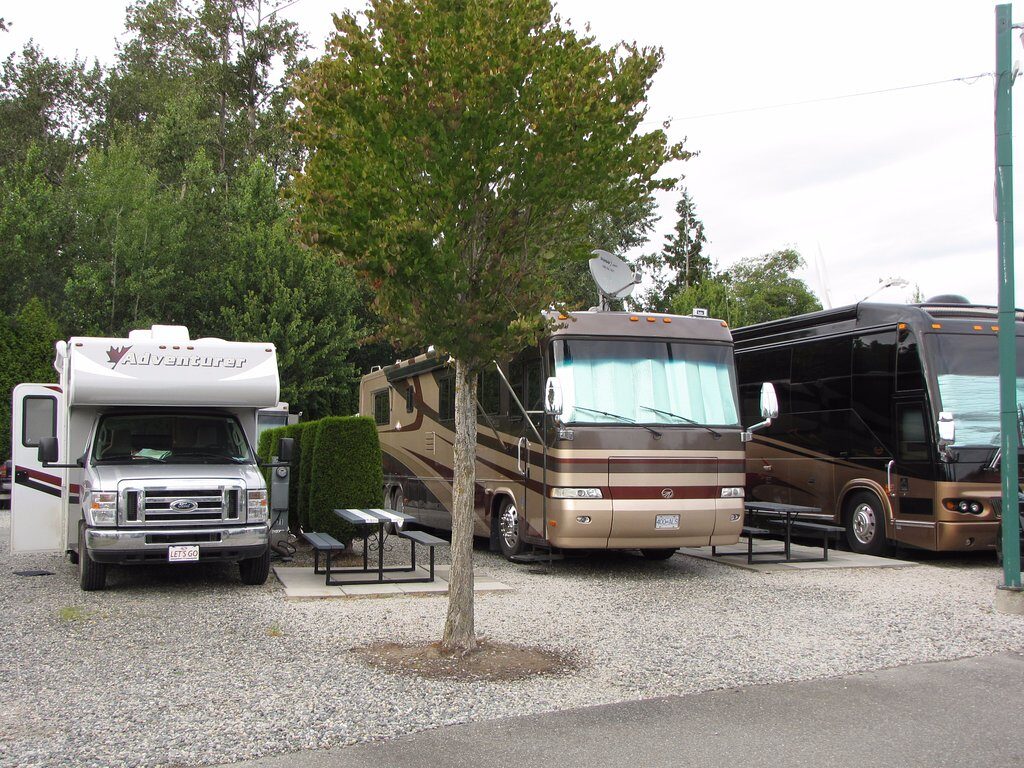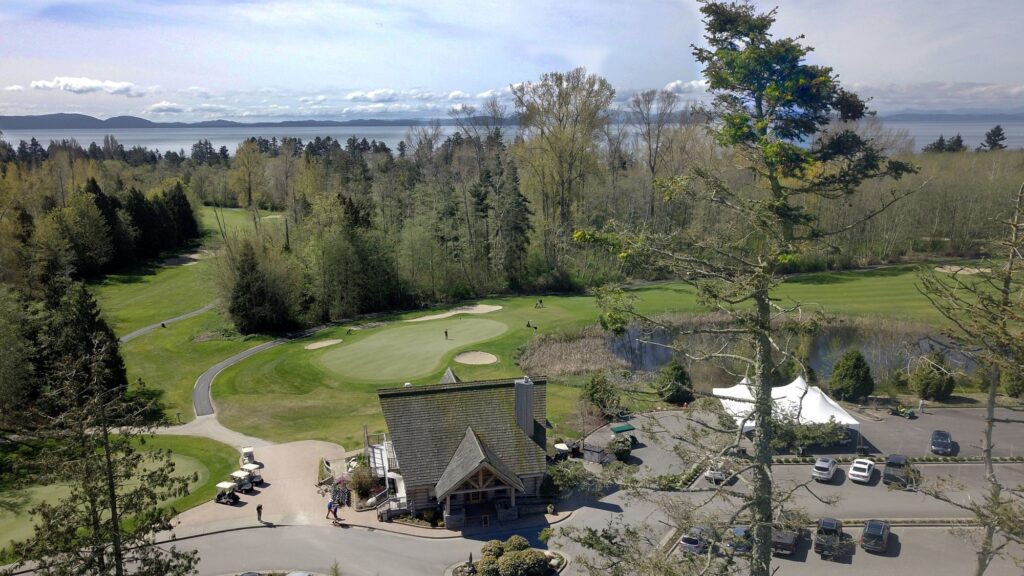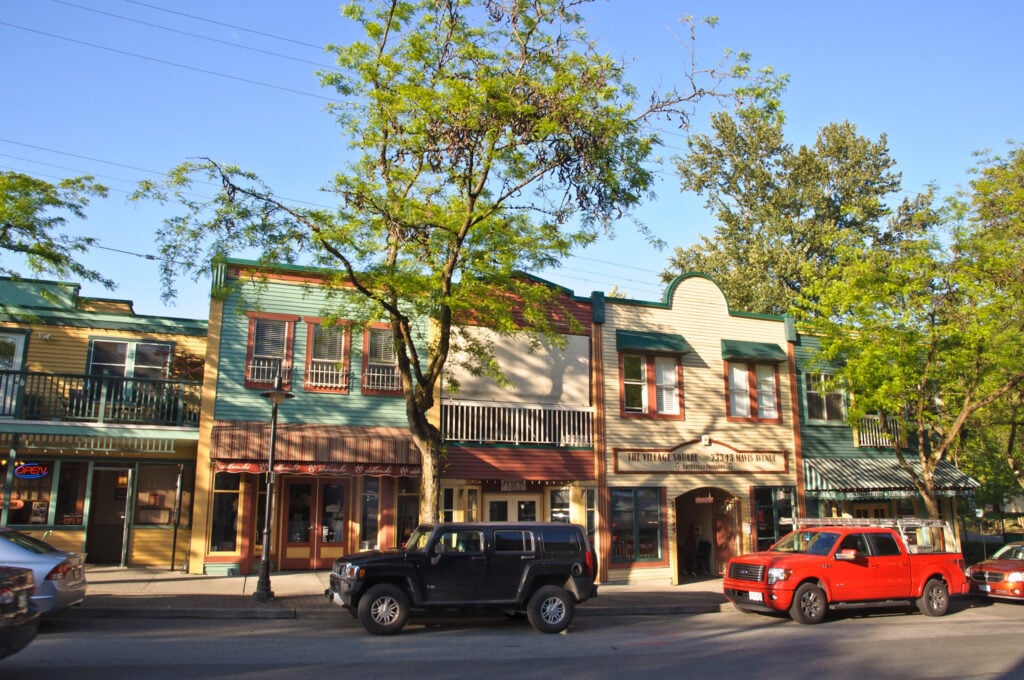Vancouver, British Columbia, Canada’s third-largest city, is fun to explore any time of year thanks to its temperate climate. Vancouver is ideally located between the Pacific coastal mountains and the Pacific Ocean.
Driving from Washington State, an easily accessible entry point is the Pacific Highway Border Crossing in Blaine, Washington, and Surrey, B.C. About a minute north of the border you’ll find Pacific Border RV Park in Surrey.

Pacific Border RV Park – Photo via TripAdvisor
Offering 119 sites, Pacific Border RV Park is popular with many visitors to the Vancouver area. Amenities include full hook-ups (30-50 amp electrical, water, sewer), restrooms, showers, laundry facilities, and Wi-Fi. There’s also an indoor pool, hot tub, sauna, and cable TV.
A short drive away, you’ll find a unique golf setting back inside the U.S. Bald Eagle Golf Club at Point Roberts can only be accessed by driving from Canada (or arriving by boat), which requires a passport. Though you’re technically golfing in the United States, Golf Canada rules govern play.
The course motto “Come Play with Nature” aptly describes this incredibly picturesque setting. A short walk to the Pacific Ocean, the course is bordered by forest preserve, ponds, and wetlands, and is also home to black-tailed deer, eagles, hawks, ducks, and blue herons. Water comes into play on half of the 18 holes, and the par 72 Bald Eagle Golf Club measures 6,868 yards from the championship tees.

Their beautiful setting. Photo via Bald Eagle Golf Club
A few miles north of Pacific Border RV Park is Fort Langley National Historic Site. Step back in time and explore this recreated historic gem that was originally built at this site by the Hudson’s Bay Company in 1827.
Set along the banks of the Fraser River, Fort Langley features plenty to entertain and educate all family members. Try your hand at an interactive display, or watch an authentic blacksmith in action. Other activities to explore include barrel-making, historic weapons demonstrations, and panning for gold!
To really experience Fort Langley, visitors can spend the night, take an audio tour, or visit the boutique shop and café.

Fort Langley, British Columbia. Photo by Caribb (Flickr)
Though Vancouver offers numerous attractions, its next-door neighbor Surrey is the second-largest city in BC and 12th largest city in Canada. It too offers a variety of options. To learn more, visit discoversurreybc.com and RV LIFE Campgrounds.

Do not take the ferry from Balfour, BC to Kootenay Landing as you will get kicked off the ferry if you have to many propane tanks in your vehicle, they will make you take the extra tank off the ferry and you put it anywhere on the dock in an unsecured,unsafearea.They don’t care if you are handicapped and the person who loads vehicles is a bully and pushes her weight around. This person didn’t care and you cannot give that extra tank to someone else on this ferry. It is an open air ferry beautiful ride across the lake but this person was very unprofessional in dealing with customers. This ferry is called the Osprey. They had to pull away from the dock turn the ferry around to re-dock then off load vehicles in front of you, once that is done they undock turn the ferry around re-dock to reload the vehicles that had to off load and continue on its way, because of this arrogant person and one lousy propane tank over this ferry was 3/4 hour late leaving Balfour and we where made to drive around the bottom of Kootenay Late to which was extra driving time. BC encourages tourism with this person and her being a bully, no customer care, plus attitude I sure won’t be coming back in that area anytime soon or other parts of BC
We will spend the first week or so with a family who lives in Vancouver and do a little round-trip with them and then head off, just the 5 of us, to the Rockies.
We too have bumped into the 20 lbs of “unattached” propane rule, but opted to store the offending bottle in an “unsecured” area on the ferry, to avoid getting off and driving a long overland route. It was the captain of the ferry who mandated this, based on Transport Canada’s federal shipping rules. The ships’ masters are responsible for all passengers’ safe passage, and if they are found negligent in enforcing the regulations on hazardous goods, such as propane, they can be fired and prevented from ever being a ship’s master again. So, to be fair to the deckhand doing her job, albeit with perhaps “an attitude, she was just the messenger, and not the rule-setter.
If that is the case then why was it allowed on an enclosed ferry with these tanks. This was an open air ferry,It was in plain view of the terminal operator to which nothing was said, except to put water into the Jerry cans, to which we complied. So this is a double standard. It should be all ferries whether they are open air or enclosed plus there is no terminal operator at this spot and it is free. Also there is no areas to place these tanks safely without someone fooling around them with an ignition source. This also should be taken into consideration. I was told by a fellow on the same ferry other people take your extra tank without any hassles so why was I made to look the idiot and he was willing to take it from me. This person had a burr up her butt and I also found out there is a labor dispute with her employer, so because of that do you become belligerent, a bully to your customers because she is angry with her employer in negotiations for a new contract. I have mobility issues try walking up a ramp and place this tank WHERE on shore, then go back down the ramp onto the ferry to your vehicle. I have a handicap placard clearly in place, she could have been more diplomatic in this situation by explaining why this needs to be done, and a fellow was willing to take it for me plus place it were; not YOU BETTER TAKE IT ASHORE and I DON”T CARE WERE attitude but no she chose to be a Drill Master, a bully and arrogant when doing her job. This person would not listen to my question or to my spouse’s question but said you either take it ashore or you are getting off the ferry so we chose the latter as we were angry with her attitude towards us. Further more why was it not stopped at the main terminals, how many people do the same thing without question and not barked at like a drill Sargent. This woman does not know how to deal with customers and should not be in that position if she can’t be diplomatic.
This article about visiting British Columbia requires updating for the realities of the COVID-19 protocols in place, beginning at the US-Canada borders. Drivers not meeting the “essential travel” test will be turned away, and this includes tourists. Best phone or check the Canada Border Services Agency web site for the very latest restrictions. We would love to have more tourists, including those in RVs, but not right now.
We’ve gone across that ferry with our 5th wheel without propane problems and we carry 2 – 30 lb tanks. Usually they want to make sure the propane tanks are turned off.
BTW, I read it is the only free ferry in BC, or maybe the longest free ferry in BC. Either way, it is a beautiful ferry ride.
I’m a lifelong British Columbian and am proud to show off our beautiful province. Just please remember that the border is now closed to Americans due to Covid. When we are back in business internationally (2021?), we will again welcome all our American visitors!